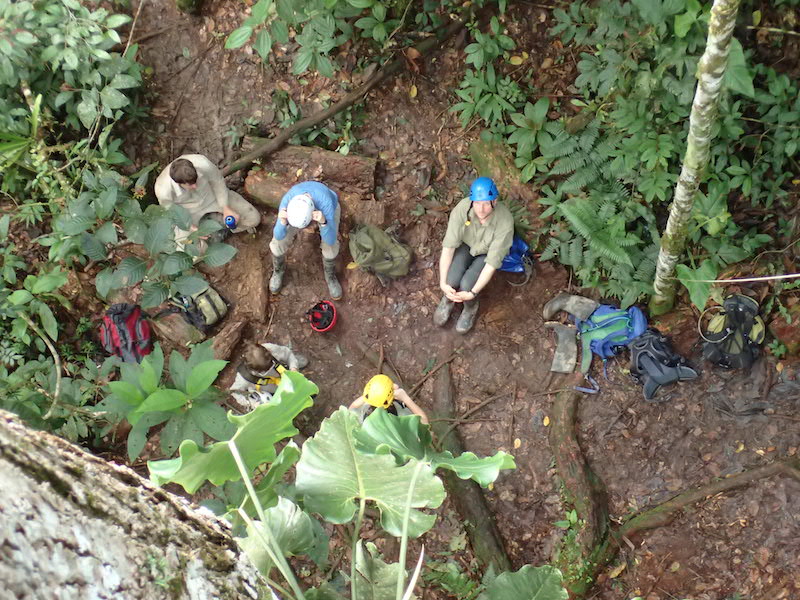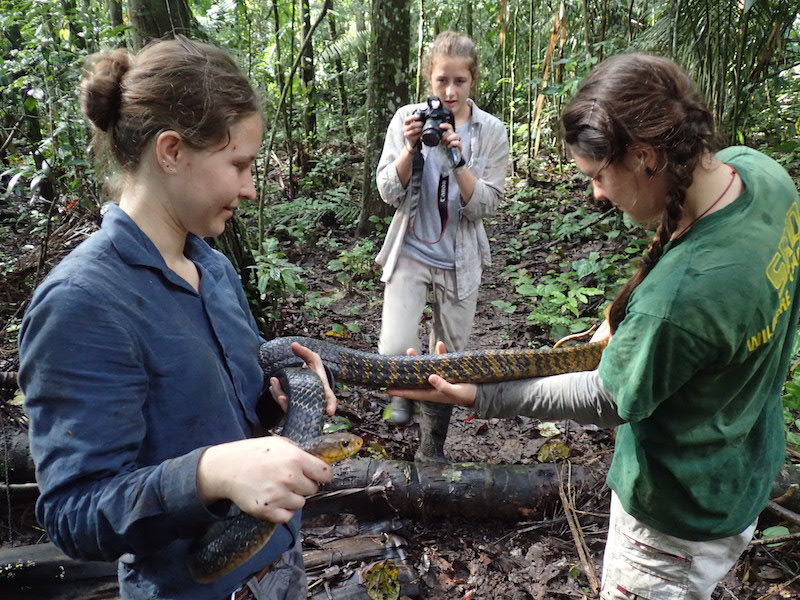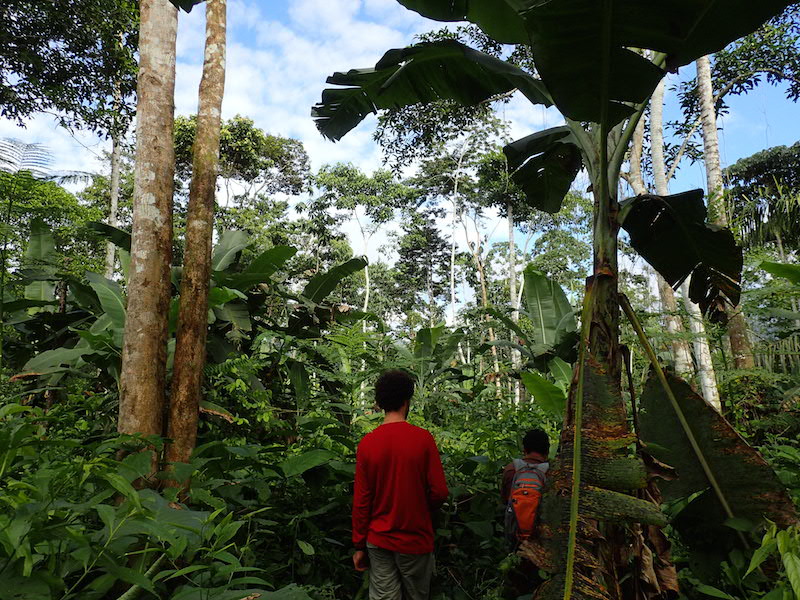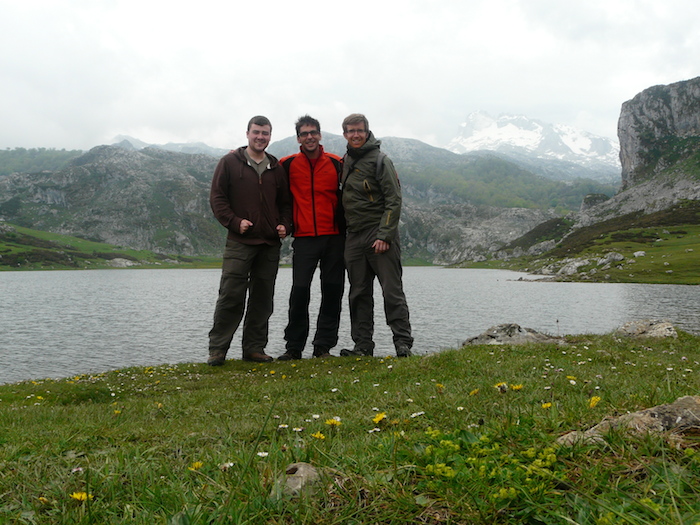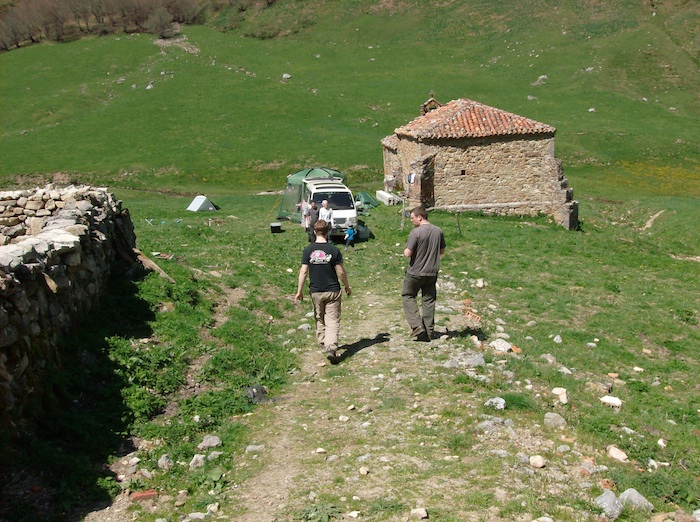Field Team: Assemble
As I belly slid down a mountain of cow manure in northern Spain, river gurgling somewhere below me in the dark and bag of salamanders in hand, one thing ran through my head: “I am supposed to be responsible for keeping people safe here”. Starting a PhD can be an abrupt change of pace, with a dramatic increase in both research responsibilities and independence. This is especially true if you find yourself in charge of a field crew working in remote locations.
Many PGR projects will require fieldwork. Within my institute (Biodiversity, Animal Health and Comparative Medicine), conservation, ecology and epidemiology (disease) projects draw researchers out of the lab and into the wild—from the hearts of jungles to the plains of Africa. However, fieldwork is not confined to biology! Across all four UofG collages, PGRs must regularly leave their desks and venture “out-of-office”.
PGR Laura Bergner studies rabies virus in Peruvian vampire bats. Good teamwork is essential! Images by L. Bergner
Before you conduct any fieldwork, as a UofG PGR you need to attend the Fieldwork Safety course (Course code: RSDA6004) , our post “Talking about Fieldwork Risk & Safety” also covers this topic. If you are going to be away from Glasgow you also need to complete the Research Furth of Glasgow process and should look into the travel insurance options on offer. For now, I am going to assume you have this aspect of your fieldwork in hand. But what if you need help collecting your data? How do you go about assembling a field crew? And how do you keep them happy and safe?
The first thing you need to think about is exactly what you require from any field assistants. How many do you need? What do you need them to do, and do they require any specific skills? Make a list of essential and desirable criteria, and be realistic. At this stage it may be a good idea to look at the UofG Equality & Diversity training, in order to avoid any unconscious discrimination against potential assistants.
As well as being explicit about what you are looking to get from your field crew, you should also make it clear what they will get from you. Ideally you would pay field assistants for their work; to do this you need to plan in advance and include funding for it in grant proposals. But even if you do this, funding can be hard to secure for field salaries, leading to a reliance on volunteers.
Unpaid positions are rampant, particularly in the fields of ecology and conservation; an issue that has drawn has drawn both criticism and debate. On one hand, volunteer field assistants gain valuable experience they can use in future job and studentship applications; on the other you are somewhat taking advantage of their desperation, as both students and professionals can’t get a paid position without first working for free. The solution is to make sure the terms and conditions work for you both. If you can, help them find funding—there are lots of organisations out there with small pots of money for this, especially if you can carve out independent projects for your assistants to take the lead on. Offer them training where possible, authorships on papers where applicable, and make sure to come up with some perks—it is common to cover all travel and living expenses… I threw in some day trips and cases of beer and everyone seemed happy!
Fieldwork can provide unique life experiences. Images by Laura Allen, a PGR studying tropical diversity.
Once you have decided what kind of person/people you need and what you can offer them, it is time to advertise the position. You will have to write a concise advert for this; examples always help, and while not a gold standard, you can see one of mine at the end of this post. There are formal channels where you can advertise vacancies for such positions within the university, such as the Glasgow Careers section of the UofG’s Careers Services webpages. However, experience tells me you will likely go a less formal route if possible.
Undergraduate students are a particularly keen group of enthusiastic, motivated people who are likely looking for practical experience opportunities. If your dates fit with their timetable, they are a great source of help—find them by contacting course coordinators and asking them to forward on a message, or reach out to student organisations. For example, if you plan to do zoological fieldwork, why not contact the student Zoological Society?
If your requirements fall outside the availability of undergraduates, you may have to throw your net a bit wider. Here use your knowledge of your area. First, email colleagues (does your institute have a mailing list?) with an advert and ask them to forward it on or send you recommendations. Next, think about local interest groups and collaborators: do they know anyone who may be interested? Finally, your field of research will probably have forums that allow you to reach a global audience, for example the Evolution Directory (EvolDir) mailing list.
Hopefully, at the end of this, you will have many people interested in joining your field crew… but how do you decide who to take? Interview them, ask for references and think about it critically. Do applicants really meet your needs? Are they competent and enthusiastic? Do you feel you can trust them? Do you feel you can get along with them? Do not feel pressured into taking someone onboard you do not feel happy with—it could be a long field season if you bring the wrong person. And that brings us into the last section—people management.
Leading a field crew as a PGR can feel odd at times. You want to have fun, but you are also the boss. Make sure you discuss your aims and desires clearly with everyone, but also be patient, especially if you are communicating across languages. Long hours and difficult conditions can make everyone tired and irritable. Keep in mind that you are responsible for their safety during work hours, but don’t forget to enjoy yourself and make friends. Ultimately, you are going to have to learn from experience how best to manage the people in your field team—everyone is different. Sometimes you will come back from a hard day's work, valuable data in hand and a happy crew itching to get back out there. Other days it is going to feel like you belly slid down a pile of manure.
Want a post on any specific area of PGR fieldwork? Have any good stories to share? Know of any grant opportunities to help fund field assistants? Please ask and/or share by commenting below or tweeting us @UofG_PGRblog.
My own awesome field crew! I lured them in with the below ad...
Voluntary field assistant position: salamander sampling, Northern Spain
“We are looking for an enthusiastic and reliable assistant to help with our field research this coming spring (April-May). Our work focuses on adaptive colouration in European fire salamanders (Salamandra spp.), and as such we will be spending approximately 4 weeks in the Principality of Asturias, Northern Spain, studying them. This is a great opportunity to work with a charismatic and iconic European species, and gain some valuable field experience.
Responsibilities will include aiding in salamander capture, processing (imaging, measuring, toe clipping and release) and driving. Fieldwork will be conducted at night after or during periods of rain, so a willingness to work unsociable hours in damp conditions is a must. Applicants will also be expected to take an equal share in general chores (e.g. cooking and cleaning).
Travel to and from the field site and basic expenses (food and accommodation) will be covered. Applicants must be flexible in start (early-mid April) and end date (early-mid May), must be over 21 and hold a full clean drivers licence (for car rental purposes). An ability to speak Spanish is a distinct advantage but is not a requirement.
Anyone interested in applying, or wanting more information, should contact me at *****@research.gla.ac.uk (or one of the below phone numbers). Applications should be a brief personal statement stating your interest in the position, appropriateness and relevant skills and experience.”





